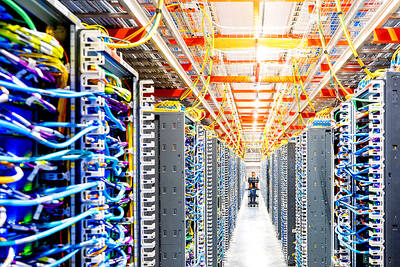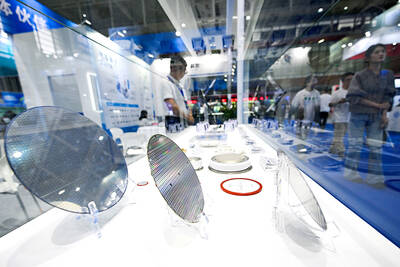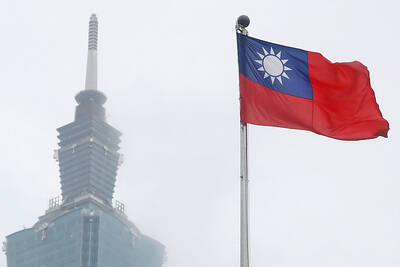Taiwan Semiconductor Manufacturing Co (TSMC, 台積電) yesterday forecast single-digit percentage growth in revenue this quarter — falling short of market expectations — after posting the lowest net profit in about one-and-half years last quarter.
TSMC, which supplies chips for Apple Inc’s iPhone series, expects growth momentum to magnify from next quarter as customers roll out new products, which are likely to help stimulate demand for its technologies used in high-end smartphones.
Revenue for the second quarter is expected to grow 6 to 7 percent to between NT$215 billion and NT$218 billion (US$6.63 billion and US$6.72 billion) this quarter, from NT$203.5 billion in the first quarter, the chipmaker said.
The growth rate is slower than the 9 percent sequential increase estimated by Credit Suisse Group AG analyst Randy Abrams and 13 percent growth predicted by HSBC Group PLC analyst Steven Pelayo.
Gross margin for this quarter is expected to rebound from last quarter’s 44.9 percent to between 49 percent and 51 percent on the back of rising demand for higher-margin 28-nanometer (nm) chips from low-end and mid-range smartphones, TSMC said.
“In the second quarter, headwinds are not much different from the first quarter. We see customers and even end-market demand increasing. [Customer] inventory restocking is still cautious,” co-chief executive officer Mark Liu (劉德音) told an investors’ conference, adding that the company would be closely monitoring the demand situation from month to month.
Due to macroeconomic uncertainty, Liu trimmed his revenue growth forecast for the worldwide semiconductor industry to 1 percent this year from 2 percent growth estimated three months earlier.
However, TSMC still aims to boost revenue by 5 to 10 percent annually this year, he said.
About 20 percent of this year’s revenue would come from its 16-nanometer chips, he added.
The company is retaining its capital spending budget at between US$9 billion and US$10 billion for this year, TSMC said.
Due to industry slowdown and a strong earthquake in February, TSMC said its net profit fell 18 percent to NT$64.78 billion last quarter, compared with NT$78.99 billion in the same period last year. That represented a quarterly decline of 11 percent from NT$72.84 billion, marking the weakest level since the second quarter of 2014.
The earthquake in southern Taiwan disrupted TSMC’s production lines in Tainan and reduced operating income by NT$7 billion last quarter, while cutting gross margin by 2.2 percentage points, TSMC said.
Commenting on the company’s progress in advanced technology development, Liu said TSMC expects to start volume production of 10nm chips in the second quarter next year and 7nm chips in the first half of 2018.
Twenty customers are intensively engaged with TSMC on the company’s 7nm technology, he said.
As to the next-generation integrated fan-out (InFO) packaging technology, co-chief executive officer C.C. Wei (魏哲家) said the company is to start volume production of InFO technology later this quarter.
The packaging technology is reportedly to be used in Apple’s new iPhones.
TSMC expects the technology to contribute US$100 million per quarter in revenue in the final quarter this year, Wei said.

AI SPLURGE: The four major US tech companies have lost more than US$950 billion in value since releasing earnings and outlooks, while equipment makers were gaining Four of the biggest US technology companies together have forecast capital expenditures that would reach about US$650 billion this year — a flood of cash earmarked for new data centers and all the gear within them. The spending planned by Alphabet Inc, Amazon.com Inc, Meta Platforms Inc and Microsoft Corp, all in pursuit of dominance in the still-nascent market for artificial intelligence (AI) tools, is a boom without a parallel this century. Each of the companies’ estimates for this year is expected either near or surpass their budgets for the past three years combined. They would set a high-watermark for capital spending

China’s top chipmaker has warned that breakaway spending on artificial intelligence (AI) chips is bringing forward years of future demand, raising the risk that some data centers could sit idle. “Companies would love to build 10 years’ worth of data center capacity within one or two years,” Semiconductor Manufacturing International Corp (SMIC, 中芯) cochief executive officer Zhao Haijun (趙海軍) said yesterday on a call with analysts. “As for what exactly these data centers will do, that hasn’t been fully thought through.” Moody’s Ratings projects that AI-related infrastructure investment would exceed US$3 trillion over the next five years, as developers pour eye-watering sums

Bank of America Corp nearly doubled its forecast for the nation’s economic growth this year, adding to a slew of upgrades even after a rip-roaring last year propelled by demand for artificial intelligence (AI). The firm lifted its projection to 8 percent from 4.5 percent on “relentless global demand” for the hardware that Taiwanese companies make, according to a note dated yesterday by analysts including Xiaoqing Pi (皮曉青). Taiwan’s GDP expanded 8.63 percent last year, the fastest pace since 2010. The increase “reflects our sustained optimism over Taiwan’s technology driven expansion and is reinforced by several recent developments,” including a more stable currency,

COLLABORATION: Taiwan and the US could jointly find solutions to weaknesses in supply chain resilience for critical materials, focusing on mining and initial refinement Taiwan is likely to purchase rare earths from the US in the future, and is also in talks with Australia and Canada to strengthen global rare earth supply chain security, Minister of Economic Affairs Kung Ming-hsin (龔明鑫) said yesterday. Taiwan and the US last month concluded the sixth Economic Prosperity Partnership Dialogue, during which both sides signed a joint statement endorsing the principles of the Pax Silica Declaration, pledging to deepen cooperation in areas including critical minerals. At the time, Kung said the two sides would establish working groups to advance cooperation in areas including artificial intelligence, digital infrastructure, critical materials and